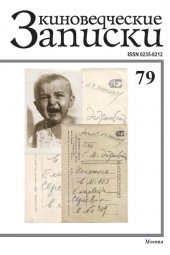 |
 |
IN MEMORIAM
Leonid KOZLOV (1933–2006)
A farewell. (Naum Kleiman, Mikhail Yampolskii)
A p p e n d i x
Notes and «Notes»:
– Of notes, 1980–1985.
– In the magazine (of the editorial correspondence 1987–2001).
On two-faced criticism. From a report of Soviet-Hungarian colloquium «East Europe film in the context of contemporary culture», December, 1989.
Leonid Kozlov was an outstanding film studier and theoretic, the most authoritative researcher of Eisenstein cinema. A landscape of film study discipline in our country is changed with his passing away. His unique position as a scholar and his way of thinking were significant for the Thaw generation. He became one of the key figures of film theory which was almost rebuilt anew when a galaxy of talented philologists, and Kozlov was among them, came to film study enriching this discipline in the second half of 1950es. In 1987 he was also one of the founders of Film Study Notes magazine. In his memory we publish few texts from his archives.
CINEMA: LIFE AND ADVENTURE
Lev ANNINSKII. Episodes of a Producer’s Life.
Well-known Russian literary and film critic wrote a book about his father The life of Ivanov. Almost a novel, this is a non-fiction story of a man and his time. Alexander Ivanov-Anninskii worked at Mosfilm studio as a production manager at the end of 1930es. The book was recently published but some chapters in the edition were reduced. In this issue we publish the first part of incomplete chapters about shooting films Alexander Nevskii, Stepan Razin and Two commanders. To be continued.
EISENSTEIN READINGS
Vladimir ZABRODIN. Three August Days: the Eisenstein Case.
Julia Eisenstein, mother of the director, died on August 8, 1947. Mother’s death and its representation in later memoirs were consciously fictionalized by Eisenstein, argues an author of this article. He supposes that the whole memoirs are mostly belles-lettres. One only has to decipher it according to keys dispersed on texts.
The author compares few sequence variants of the text about mother’s death tracing the process of converting a fact into narration.
EXPERIENCE
Eugene DOBRENKO. Shootings from underground: a dialectics of agents thinking.
The author considers Soviet historical ideological films (such as Great Citizen, Trilogy of Maxim and so on) as a reflection of Stalin’s paranoiac consciousness. In plots based on conspiracy a real social situation is easily replaced with conspiracy because it explains the reasons of world evil and bring into the world order and logic. Thus, the genre of historical films about revolutionary is an ideal screen for the Soviet political mentality.
A THEME FOR EXPLORATION
Аleksei GUSEV. A Subjective Camera in Postclassical non-Russian Cinema (1960–2000).
A history of using a camera in a film as a way of rendering a subjective view of a character and a classification of such using methods.
IN SPACE OF CULTURE
Nikolai KHRENOV. Archetypes and Issues of Film Perception.
The report on an international conference «Narration and spectatorship in moving images: reception, imagination, emotion» (Potsdam, July 20–23, 2006).
The XXth century has product some type of culture in which cinema functions and is recepted. How does this type influence on activation of the archetypical conscious in film? The author formulates three theses about activity of the archetypical conscious in its different aspects, which is to be taken in account when one analyses narration and reception of a film.
Victoria CHISTYAKOVA. The «Geese» and «the Third meaning». Searching for a Determination of an Artistic Method in Film.
Considering the «method» of Sergei Eisenstein, a researcher tries to assemble «metafilm» of Tarkovskiy in order of his manner to create an image in film which she explains on example of a one shot in Andrei Rublev.
ON INTERPRETATION OF A FILM
Larisa BEREZOVCHUK. La Pianiste: a Verdict to the Romanticism. A Person—A Society—A Culture in Haneke Author Film.
An analysis of the film aesthetics from a point of view intersected a culturology, a sociology and a music study.
XXVIII МOSCOW FILM FESTIVAL
Denis VIREN. A Turn to a Man. «Young Cinema» of XXVIII МIFF.
Lidiya KANASHOVA. Аutorhetorical Question.
Andrei SHEMIAKIN. Mind the door open. A Subjective Notes about «Free Thought». Documentaries on XXVIII МIFF
The items of critical reviews are festival competitions, which were a plenty of film debuts, a media forum and a documentary section. Do the represented debuts have something in common and how does it represent modern film process? — The first critic asks himself and gives unexpected answers. This year the media forum program was named «Author(writ)y» and based on video art which concerns author(writ)y as both the impersonal discourse of power in contemporary society and social activism discourse using media as its means. The reviewer analyses Russian video art on Forum and argues about its disadvantages. The «Free thought» program included works by Frederick Wiseman, Barak Goodman and Werner Herzog. In the review is also considered Workingman’s death by Michael Glawogger.
MARGINALIA
Sergei KAPTEREV. Medvedkin in Cambridge.
A review of a new book written by Emma Widdis, published in KINOfiles series: Alexander Medvedkin.
CHRONICLE. INFORMATION
Awarded by Kinovedcheskie Zapiski for the best diplomas on the film study faculty of VGIK in 2006.
Magazine’s awards on XXVI Students Film Festival in VGIK. |
|
 |
|||||||||||||||||||||||||||||||||||||||||||||||||||||||||||||||||||||||||||||||||||||||||||||||||||||||||||||||||||||||||
| « | » |
является незаконным.



